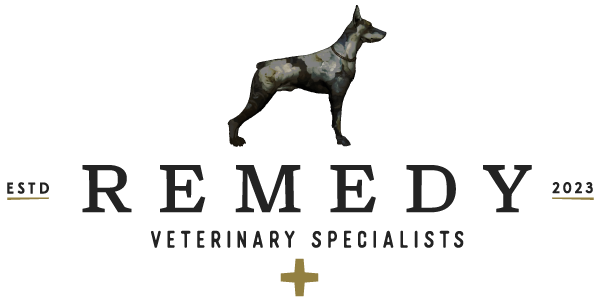Polyradiculoneuritis aka Coonhound Paralysis
Explanation
Polyradiculoneuritis is an inflammation of the nerves and the roots of the nerves that attach to the spinal cord, as well as the nerve sheaths. The disease is similar to Guillain-Barre syndrome in human beings. We do not know the exact cause of this inflammation. It is frequently associated with being scratched or bit by a raccoon, but not all dogs with the disease have had exposure to a raccoon.
The inflammation of the nerves causes paralysis, often in all four limbs. This typically happens quickly over a few days, but signs can progress for up to two weeks.
Diagnosis
There is not a specific test for this disease. We often diagnosis it based on history (i.e. exposure to a raccoon) and the symptoms. We may recommend testing to look for other causes of nerve inflammation, such as infections or cancer. Other testing, such as a spinal tap, electrodiagnostics and nerve biopsies, may also be recommended.
Treatment
If the disease is caught within the first few weeks, we will recommend an infusion of immunoglobulin. This is known to significantly shorten the duration of Guillain-Barre, and has shown promising results in dogs as well. This treatment can be expensive, and may be cost prohibitive for some pet parents.
The key to recovery from this disease is time. With appropriate nursing care, most of these dogs will recover. Information on taking care of a pet who cannot move on its own can be found here (recumbent care). Severely affected dogs may need advanced care, such as being placed on a ventilator.
Physical therapy is recommended for all pets with this condition.
Prognosis
The majority of dogs can recover from this condition. However, nursing care can be intense, and recovery may take several months. Nerves take time to heal themselves, and unfortunately there is little we can do to speed that along.
Monitoring
Please contact the neurology department if you see any of the following:
Signs of pain (link to pain scoring sheet)
Difficult breathing
Please monitor skin health carefully. Bed sores can be dangerous if not caught early.
Please monitor for signs of pneumonia (difficulty breathing, coughing, lethargy, fever)
Contact Us:
Mon \ Fri: 8:30am - 5:30pm
Sat: by appointment only
Phone: (415)967-3303
Email: frontdesk@remedyvets.com




